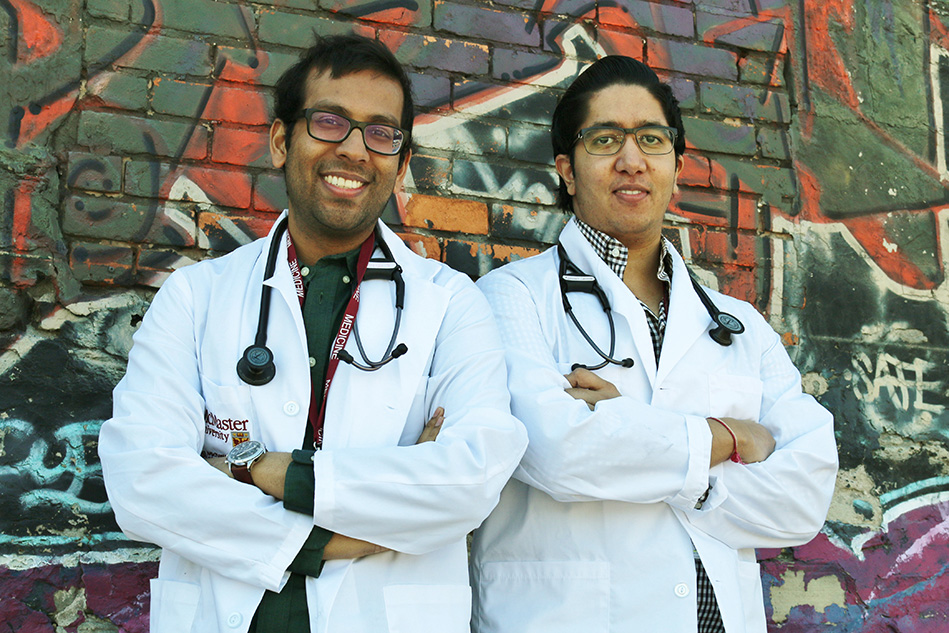These students are committed to the core

Kevin Singh (left) and Avi Sarker in front of a graffitied wall near the Hamilton Urban Core Community Health Centre on Rebecca Street, Hamilton.
Avi Sarker and Kevin Singh were two strangers — to each other and to the City of Hamilton —when they entered McMaster University’s Michael G. DeGroote School of Medicine in 2013. But the now tight-knit duo is changing Hamilton’s downtown with a project to help marginalized populations.
“I had never been to Hamilton before,” laughs Singh, who grew up in Toronto. “But when I came to school here, I felt like I was at home. The feeling of community is really strong here.”
Such a strong feeling, adds Sarker, a native of Edmonton, that they wanted to give back to the to the city by establishing MacHealth DNA, a community engagement project that partners Faculty of Health Sciences students with the Hamilton Urban Core Community Health Centre team to deliver care and health advocacy.
They were inspired by The Hamilton Spectator’s “Code Red” series, which highlighted the city’s health disparity between different socioeconomic classes, Singh and Sarker wanted to help mend the divide, and they knew that McMaster students could do just that.
“McMaster is synonymous with Hamilton and vice versa. It’s a hard-working, blue collar city. But McMaster is in the west end, so there’s not a lot of opportunities to get into and give back to the core,” says Singh. “We’re provided with world-class hospitals to do our training. We feel this is the best way to give back to the community.”
They saw that the Urban Core had limited healthcare resources. So in 2015, Singh, Sarker and eight other students launched a pilot project as an opportunity to help Hamilton’s core while giving students a perspective on how social and physical environments impact health.
The project was met with great success, says Sarker. By October of that year, they opened MacHealth DNA’s doors to a full run.
“We sat down and had conversations for almost a year — imagining, creating a vision,” says Denise Brooks, executive director of the Urban Core Community Health Centre.
“Avi and Kevin’s commitment has got to be honoured and respected everywhere. Not only did they create something that they can be engaged with now, but they did it for others that will last beyond their years at McMaster. They’ve created a legacy so that others can also be helped or volunteer years after Avi and Kevin have graduated.”
The clinic runs twice a week on Tuesday and Thursday evenings at the corner of Rebecca and John Streets, and is a combination of volunteers, medical students and physicians providing care for refugees and disadvantaged people.
“It’s one thing to read about it; it’s another thing to actually be there. It really is humbling,” says Sarker. “Many people don’t have guarantees of meals or shelter. They’ve been ostracized from the community. The Urban Core has been an opportunity for them to start fresh, and it’s really been a positive environment for us to learn.”
Tuesdays and Thursdays begin at 5:30 p.m. with a clinic-based approach that runs the same way as typical medical training — patients are seen by students and reviewed by a physician. Also running at that time are clinic programs to help with smoking, nutrition, women’s health, parenting, diabetes and more.
Sarker says they’ve seen an immediate impact with the presence of the students.
“With a doctor, patients can sometimes be intimidated. But with the students, people are opening up. You really learn about the impact you can have as an individual. When people hear that you’re a McMaster medical student, there’s a lot of trust put in that — in what we’re trained to do, how to talk to people, how to develop a rapport. At the end of the day that’s what McMaster students do better than anyone else”
With convocation on the horizon for Singh and Sarker for May 27, MacHealth DNA is in a transition period, but the torch is being passed to the next student directors, Gaibrie Stephen and Christine MacCauley, and the transition to the next group of student volunteers will be seamless.
A quarter of the 2018 graduating class has already applied to be involved next year, says Sarker. “That says a lot.”
As for Singh and Sarker, they say this experience has been inspirational for their career paths. Both are hoping to work in inner-city health in the future.
“Just seeing the changes from week to week with these patients and these students has been truly my most memorable moment,” says Singh. “From making a difference in their health to even just being there to listen, this has been such a rewarding experience, and one that I’ll truly carry with me moving forward.”


